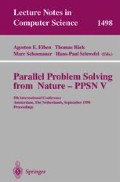Abstract
A new algorithm is presented for accelerating the convergence of evolutionary optimization methods through a reduction in the number of fitness function calls. Such a reduction is obtained by 1) creating an approximate model of the fitness landscape using kriging interpolation, and 2) using this model instead of the original fitness function for evaluating some of the next generations. The main interest of the presented approach lies in problems for which the computational costs associated with fitness function evaluation is very high, such as in the case of most engineering design problems. Numerical results presented for a test case show that the reconstruction algorithm can effectively reduces the number of fitness function calls for simple problems as well as for difficult multidimensional ones.
Preview
Unable to display preview. Download preview PDF.
References
Keane, A. J.: Experiences with optimizers in structural design. Proc. Conf. Adaptive Computing in Engineering Design and Control (1994) 14–27
Keane, A. J.: Passive vibration control via unusual geometries: the application of genetic algorithm optimization to structural design. Journal of Sound and Vibration 185 (1995) 441–453
Baek, K.H., Elliott, S.J.: Natural algorithms for choosing source locations in active control systems. Journal of Sound and Vibration 186 (1995) 245–267
Ratle, A., Berry, A.: Use of genetic algorithms for the vibroacoustic optimization of plate response. Submitted to the Journal of the Acoustical Society of America.
Michalewicz, Z., Schoenauer, M.: Evolutionary Algorithms for Constrained Parameter Optimization Problems. Evolutionary Computation 4 (1996) 1–32
Michalewicz, Z.: Genetic Algorithms + Data Structure = Evolution Programs, 2nd ed. Berlin, Springer-Verlag (1994)
Matheron, G.: The intrinsic random functions and their applications. Adv. Appl. Prob. 5 (1973) 439–468
Matheron, G.: Splines et krigeage: leur équivalence formelle. Technical Report N-667, Centre de Géostatistique, école des Mines de Paris (1980)
Trochu, F.: A contouring program based on dual kriging interpolation. Engineering with Computers 9 (1993) 160–177
Bäck, T., Schwefel, H.-P.: An Overview of Evolutionary Algorithms for Parameter Optimization. Evolutionary Computation 1 (1993) 1–23
Author information
Authors and Affiliations
Editor information
Rights and permissions
Copyright information
© 1998 Springer-Verlag Berlin Heidelberg
About this paper
Cite this paper
Ratle, A. (1998). Accelerating the convergence of evolutionary algorithms by fitness landscape approximation. In: Eiben, A.E., Bäck, T., Schoenauer, M., Schwefel, HP. (eds) Parallel Problem Solving from Nature — PPSN V. PPSN 1998. Lecture Notes in Computer Science, vol 1498. Springer, Berlin, Heidelberg. https://doi.org/10.1007/BFb0056852
Download citation
DOI: https://doi.org/10.1007/BFb0056852
Published:
Publisher Name: Springer, Berlin, Heidelberg
Print ISBN: 978-3-540-65078-2
Online ISBN: 978-3-540-49672-4
eBook Packages: Springer Book Archive

